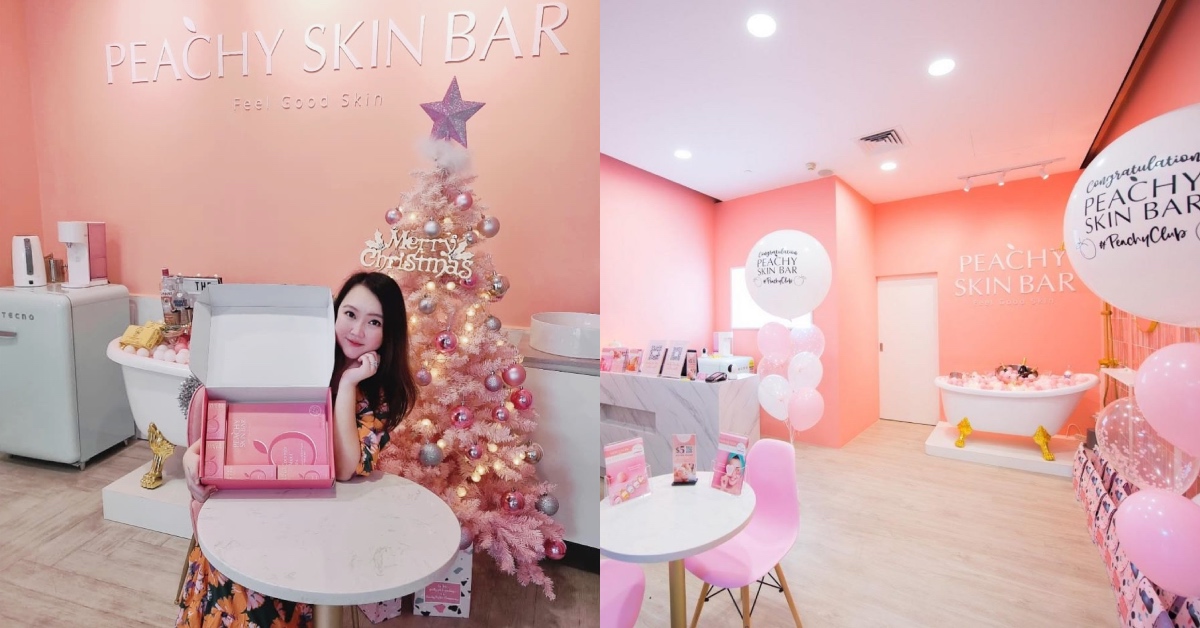I don’t know about you, but I’ve always felt a sense of dread going to a beauty salon.
Sure, they get the job done, whether it’s a fresh manicure, a rejuvenating facial, or a quick brow fix, but the relentless upselling, hidden charges, and rigid packages often leave me feeling cornered rather than pampered.
Crystal Lee is all too familiar with this pain point. In 2019, the former branding executive took a leap of faith to start Peachy Skin Bar as she sought to “revolutionise” the beauty service experience with greater transparency.
She picked up beauty skills when she was a teenager

“Despite being saturated with competition, I still saw a gap in the market—the local beauty salon industry hadn’t caught up with new-age customer trends and needs,” shared Crystal.
According to the 33-year-old, the beauty industry’s business practices still seemed “mired in the 1980s,” even with “technology having transformed the way they do business.”
“Apps and platforms lure customers in with ridiculously low prices, [but start] hard-selling them once they walk in through the door.”
But part of the reason why Crystal started Peachy Skin Bar was because of her mother, who used to run her own home salon before she decided to retire.
“I grew up in a home salon since I was a child, and I started picking up the skills for facials really early on, occasionally helping my mum over the school holidays since my late teenage years,” she shared in a previous interview with The Vent Machine.
She taught me that beauty services go far beyond just skin care—you also had to provide a safe space for people to unwind from their busy lives. I used to see many of my mum’s clients eagerly look forward to their appointments.
Crystal Lee, founder of Peachy Skin Bar
They’re known for their omakase facials

Peachy Skin Bar specialises in customised facials, with treatments priced between S$120 to S$150, though medical grade treatments can go up to S$500.
They’re most known for their omakase treatment—in Japanese cuisine, omakase means “I’ll leave it up to you,” where customers trust the chef to create a unique dining experience based on their expertise.
Peachy Skin Bar’s omakase treatment follows the same principle, where customers place their trust in the beauty salon’s estheticians to tailor a treatment that best addresses their skin’s individual needs.
The best part about Peachy Skin Bar is the absence of hard-selling or hidden costs—everything is laid out transparently, with all the details easily accessible on their website.
When I visited their salon, I left feeling genuinely satisfied—I wasn’t pressured with sales pitches immediately after my treatment, and I even got to enjoy complimentary champagne after my session, which added a nice touch to the experience.
Although I opted for an à la carte treatment, they also offer a membership for those looking for more regular services.
The business had to stop “95% of their operations” during COVID-19

Crystal self-funded her business, launching Peachy Skin Bar’s first ever outlet at Citygate, but the business was hard hit by the pandemic just four months after its opening.
“Apart from the typical business struggles a startup would face like building up a new brand, we were also thrown into a very uncertain market environment due to COVID-19,” she shared.
During the lockdown, the business had to stop about “95% of their operations,” with their revenues taking a “great hit.”
When business picked up, they launched a second outlet at Seletar Mall in 2021, but as Peachy Skin Bar grappled with manpower shortages and rising rental costs, Crystal decided that the best move was to shut down these outlets and relocate to a more central location in Bugis.
At the same time, they decided to double down on their initiatives to improve their overall customer experience by hiring dedicated “customer happiness executives” to ensure a pleasant environment throughout the entire service journey.
They aim to break even within the next two years

As the business “has seen steady growth” over the past few years, Crystal hopes to achieve positive financial results and break even within the next one to two years.
To date, they’ve built “strong partnerships” with beauty, lifestyle, and luxury brands, including Japanese skincare brand Saborino and homegrown fine jeweller Lee Hwa Jewelry, and have worked to develop and offer perks for the employees of major firms like Google.
Looking forward, Crystal shared that she would be launching a “curated lifestyle brand” featuring a series of take-home skincare products that can help their customers maintain their facial results between salon visits.
“This line can also appeal to new customers who may not have the time or preference for facials, but still want to care for their skin from the comfort of their home,” she added.
- Find out more about Peachy Skin Bar here.
- Read other articles we’ve written about Singaporean startups here.
Featured Image Credit: Peachy Skin Bar



